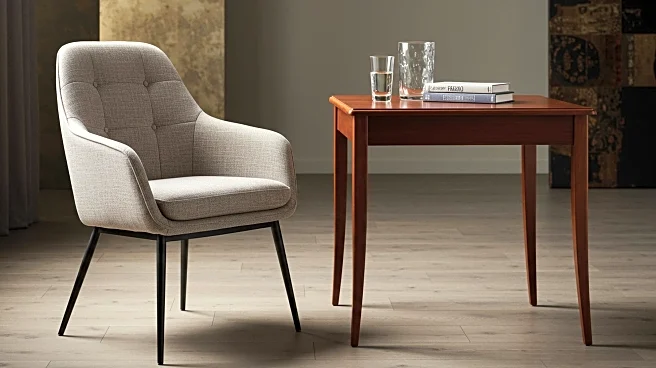What is the story about?
What's Happening?
The Trump administration has announced a 50-day investigation into the furniture market, with the intention of imposing tariffs on furniture imports. President Trump revealed this plan through a post on Truth Social, emphasizing the goal of revitalizing the U.S. furniture industry. The investigation primarily targets imports from China and Vietnam, which together account for approximately 60% of U.S. furniture imports. The move aligns with previous tariff strategies aimed at boosting domestic manufacturing and reducing dependency on foreign goods. Currently, foreign goods face a baseline tariff of 10%, with specific deals imposing higher rates, such as 20% on Vietnamese imports and a temporary 10% on Chinese imports, which could increase after a 90-day pause. The announcement has already affected the stock market, with shares of major U.S. furniture retailers like Wayfair, Williams-Sonoma, and RH experiencing declines in after-hours trading.
Why It's Important?
The imposition of tariffs on furniture imports is significant as it reflects the Trump administration's broader economic strategy to bolster domestic industries by reducing reliance on foreign manufacturing. This move could potentially benefit U.S. furniture manufacturers, particularly in states like North Carolina, known for its robust furniture industry. However, it also poses challenges for retailers and consumers, as increased tariffs could lead to higher prices for imported goods. The stock market's reaction, with declines in major furniture retailers' shares, indicates investor concerns about the potential impact on sales and profitability. Additionally, the tariffs could strain trade relations with key suppliers like China and Vietnam, affecting broader economic and diplomatic ties.
What's Next?
Following the 50-day investigation, the Trump administration is expected to finalize and implement the new tariffs. This decision will likely prompt reactions from affected countries, potentially leading to negotiations or retaliatory measures. U.S. furniture retailers and manufacturers will need to adapt to the changing market dynamics, possibly by increasing domestic production or seeking alternative supply chains. Consumers may also face higher prices, influencing purchasing decisions and potentially impacting overall demand in the furniture market.














